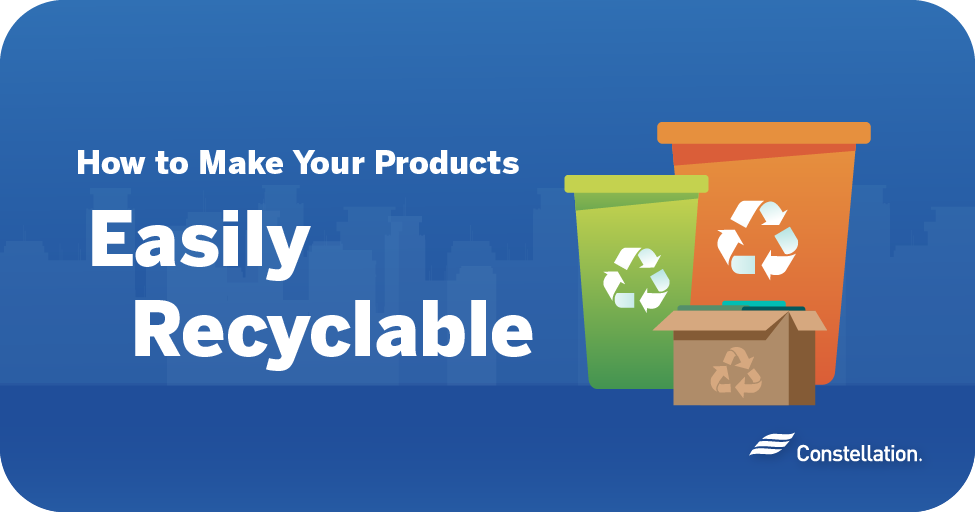Your small business can design for recycling and contribute to a greener community. Learning how to make recycling easy for your customers is something that will pay dividends to your reputation and bottom line–in addition to improving the environment.
Consumption in the US is currently at the highest level in history. The average American produces more than 1,700 pounds of waste a year. Businesses contribute even more. Food alone takes up more space in landfills than anything else. Product recycling can cut down on waste. Adopting practices that increase recycling for businesses can make your company part of a sustainable community.
5 effective ways businesses can help make recycling easy for consumers
If you can increase consumer recycling, you can help reduce waste production. Increasing sustainability by incorporating recycling into your business will have an impact. Something as simple as providing a recycling bin by the trash bin reminds consumers to be more mindful of the waste they produce and aware of recycling as an option. These are great ways for businesses to go green.
1. Use eco-friendly product packaging
You can improve product recycling by putting some thought into your product packaging. The type, amount and variety of materials in your packaging matter when it comes to recycling. Reducing the materials in your packaging eliminates waste and may cut costs. Using fewer materials makes recycling much easier.
Tips for effective product packaging
When you design for recycling, start with your package. Reduce what people throw away and change how they discard your package. In addition to the tips below, the Sustainable Packaging Coalition is a great resource for ideas.
- Use environmentally friendly packaging
- Use materials made with post-consumer waste
- Use smaller or less packaging
- Make products easy to dissemble to reduce the amount of packaging needed
- Eliminate things like flexible plastic, which is hard to recycle
- Minimize the number of different materials used in your package to simplify the process
- Encourage customers to reuse your packaging
2. Source products from environmentally conscious producers
The environment is a complex system, so it makes sense that protecting it is similarly complex. Decisions we make related to energy, materials, manufacturing processes and shipping are interconnected. Sourcing products from ethical producers and factories can be a resource for expertise and know-how for how to make recycling easy for your customers. Because they share the same goals, it is easier for you to work together with them to reduce the overall materials, energy and waste produced by your business.
What is an EPR?
EPR stands for Extended Producer Responsibility. In some countries, laws hold manufacturers financially responsible for all environmental costs of a product throughout its life. EPR laws, a trend just getting started in the United States, encourage businesses to look at environmental costs and design for recycling in a way that creates less waste.
3. Educate staff and consumers on recycling practices
You can encourage product recycling by educating staff and customers on the importance of recycling. You can also implement better recycling practices internally. For example, you can recycle old office equipment, start recycling light bulbs and adopt environmentally friendly work practices.
Companies that take the time to explain their recycling commitment and goals show customers that they are responsible. Take the extra step of engaging customers in sustainability. Explain how they can recycle or reuse your products and do all you can when thinking through how to make recycling easy.
Tips to increase customer awareness of recycling
Communication is the key to bringing customers into your sustainability process and encouraging them to recycle.
- Online education. Explain your recycling program and show customers how they can recycle your products and packaging.
- Social media. Social media is a great place to share tips that can increase consumer recycling and to celebrate recycling achievements
- Product design. It doesn’t hurt to let customers know how your design cuts waste. Poland Spring touts its eco-friendly packaging and bottle caps that were redesigned to use less plastic.
4. Encourage cleanliness and separating trash
Clean packaging and products are easier to recycle. Separating materials also reduces the energy needed to process recyclables. Provide separate bins for paper, plastic and metals. Minimize use of mixed materials. The EPA provides details and tips on making recycling easier and less resource intensive.
5. Try composting waste
Waste production in the US reached 292.4 million tons in 2018, equating to 4.9 pounds per person per day. We can each do our part to cut that number down by reducing what goes into landfills. In addition to recycling, consider composting. If your business produces biological waste, like restaurants and food processing companies, composting reduces waste and produces nutrient-rich material that can fertilize food production. Your business can help on a smaller scale by composting bio-waste from your lunch room.
Why is recycling important for small businesses?
Recycling is more than important for your business. It is good for your business. Whether you start with small-scale projects or commit, like many large companies have, to zero-waste, when you design for recycling you, your employees, customers and community benefit.
- Help protect the environment. Achieving the UN’s sustainability goals will take the involvement of every person and business. Beyond that, your contribution to helping the environment has a direct impact in your immediate community.
- Attract more customers to your business. Customers value a company that contributes to the community, especially when it comes to the environment. Whether you commit to green energy vs renewable energy, you’ll improve your reputation and get a competitive edge.
- Reduce daily operational costs. Business recycling practices can reduce your costs. Depending on your industry, you can save by buying in bulk, consolidating storage to reduce refrigeration costs, buying recycled inputs and increasing product recycling.
Design for recycling and make product recycling a core part of your business. You will be doing the environment and your business a world of good.
